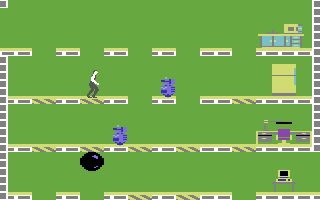Pinkie is a platform game developed by Millennium Interactive and designed by Scott Williams for the Amiga in 1994. The game features a pink elephant protagonist navigating through various colorful environments in what represents one of the later entries in the Amiga's platformer catalog.
Unlike many Amiga platformers that received multi-platform releases, Pinkie remained largely exclusive to Commodore's machine, limiting its exposure compared to more widely distributed titles like Superfrog or the James Pond series. This exclusivity, combined with its distinctly child-oriented approach, meant that Pinkie occupied a specific niche within the Amiga's software library.
The game's most immediately striking feature is its pastel-toned visual presentation, which lends an undeniable charm to the entire experience. The soft, muted color palette creates an almost dreamlike quality that sets Pinkie apart from the more vibrant and energetic visual styles typically associated with Amiga platformers. While some environments appear relatively sparse in terms of background detail, this minimalist approach often works in the game's favor, creating clean, uncluttered playfields that allow the character animations and key interactive elements to stand out clearly.
The gameplay mechanics draw heavily from established Amiga platformer conventions, particularly those popularized by the James Pond series. Players guide Pinkie through side-scrolling levels, collecting items, avoiding enemies, and solving environmental puzzles. The controls are responsive and well-suited to the Amiga's joystick, though they lack the precise refinement found in premium titles like Superfrog or Zool. The character movement feels appropriately weighty for an elephant, though this can occasionally make precise platforming sequences more challenging than intended.
What elevates Pinkie above simple derivative status is its inclusion of genuine surprises and relatively complex puzzle elements. Unlike straightforward run-and-jump platformers, certain sections require players to think strategically about how to progress, incorporating elements that wouldn't feel out of place in a puzzle-adventure game. These sequences add welcome variety to the otherwise familiar platforming formula, though they may prove frustrating for younger players who represent the game's primary target audience.
The level design demonstrates solid craftsmanship without reaching the inspired heights of classics like Superfrog. Each stage presents a logical progression of challenges, with new gameplay elements introduced at appropriate intervals. The difficulty curve is carefully calibrated for younger players, though this measured approach may leave experienced platformer enthusiasts wanting more substantial challenges.
Compared to Team17's Superfrog, Pinkie lacks the polish and production values that made that game a standout title. Where Superfrog featured exceptional sprite work, memorable music, and precisely tuned gameplay mechanics, Pinkie offers a more modest but still competent experience. The comparison with James Pond proves more favorable, as both games share similar structural approaches and target demographics, though Chris Sorrell's creation maintains superior level design and more memorable character personality.
The audio presentation complements the visual style appropriately, with gentle musical themes that reinforce the game's child-friendly atmosphere. The sound effects are functional without being particularly memorable, lacking the creative flair that distinguished the best Amiga platformers of the era.
Pinkie's primary limitation stems from its uncompromising focus on younger players. While this approach ensures accessibility and age-appropriate content, it also restricts the game's broader appeal. Adult players seeking the challenge and sophistication of titles like Flashback or Another World will find Pinkie's gentle difficulty curve and simplistic themes insufficient to maintain long-term interest.
The game succeeds admirably within its intended parameters, offering a safe, entertaining experience for children while maintaining enough puzzle complexity to prevent complete tedium for supervising adults. Scott Williams deserves credit for creating a platformer that respects its young audience without condescending to them, incorporating genuine gameplay challenges within an appropriately accessible framework.
For Amiga owners seeking family-friendly software, Pinkie represents a solid, if unremarkable, choice. It acquits itself honorably within the competitive landscape of Amiga platformers, though it struggles to establish a distinctive identity beyond its appealing visual presentation. While it successfully captures many of the characteristics that made James Pond successful, it lacks the innovation and memorability necessary to eclipse its inspiration, resulting in a competent but ultimately forgettable entry in the Amiga's extensive platformer library.













